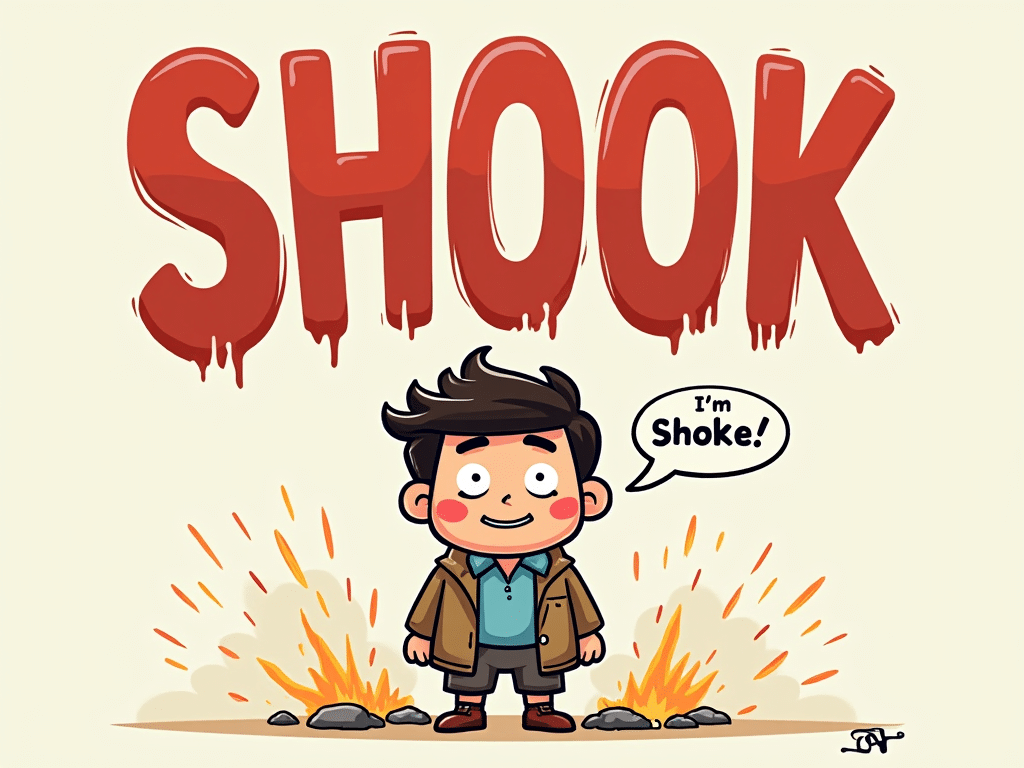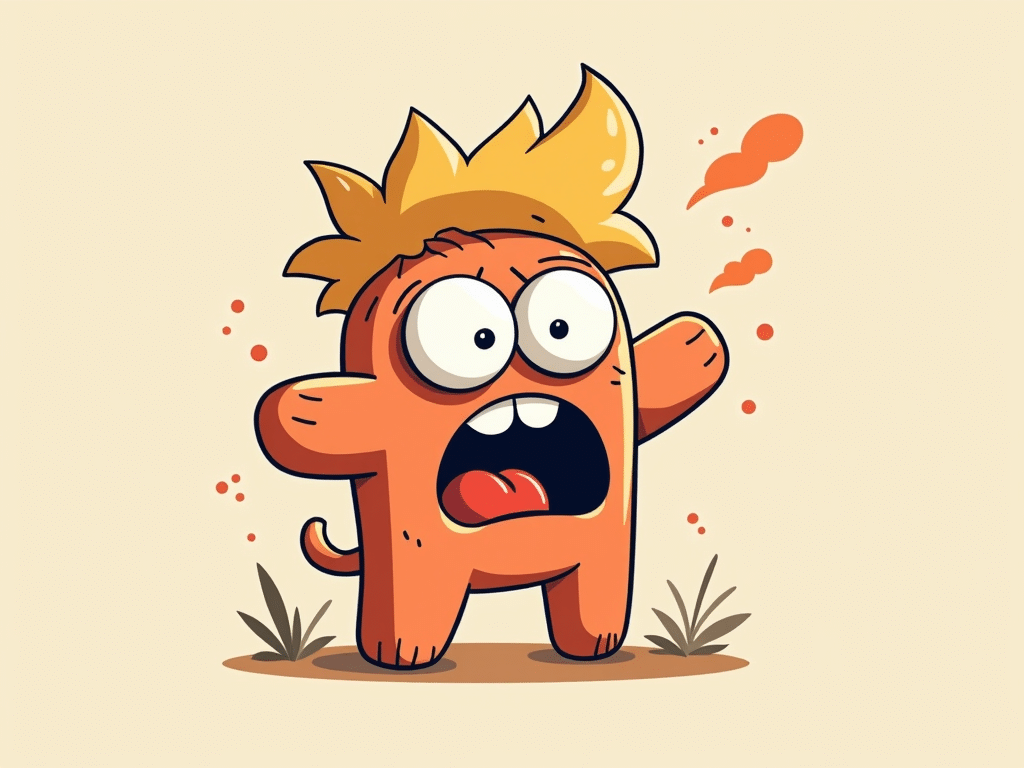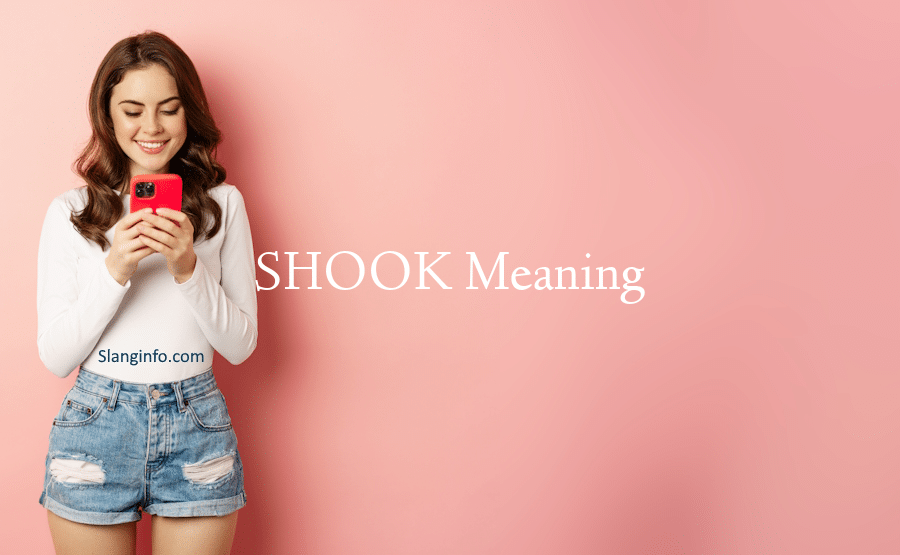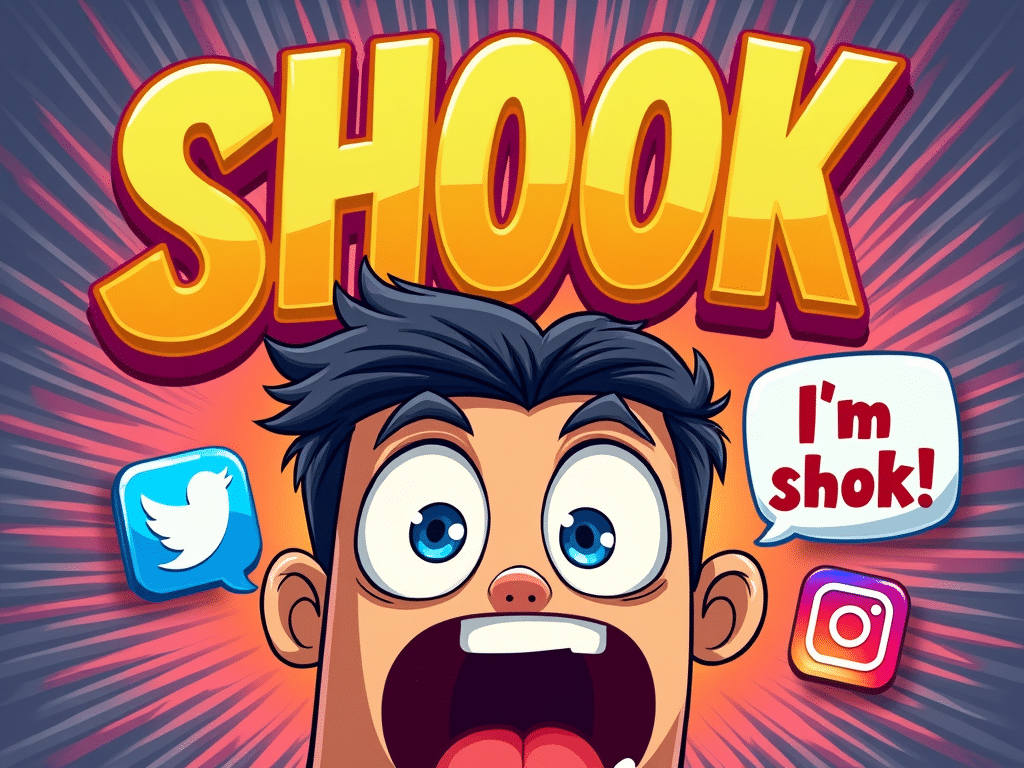Have you ever felt so surprised or shocked that you couldn’t even speak? That’s exactly what the slang term shook is all about. This popular expression has taken over social media, memes, and everyday conversations, becoming a go-to word for describing intense emotional reactions. But where did “shook” come from, and why has it become such a big deal in our modern language? Let’s dive into the world of “shook” and uncover its fascinating journey from standard English to internet sensation.
| Key Takeaways |
|---|
| Shook means extremely surprised, shocked, or emotionally affected |
| The term originated from African American Vernacular English (AAVE) |
| It gained popularity through social media and meme culture |
| Shook is used to express a range of intense emotions |
| The term has evolved to include variations like “shooketh“ |

What Does Shook Mean?
At its core, being “shook” means being extremely surprised, shocked, or emotionally affected by something. It’s like that feeling when your jaw drops and you can’t believe what just happened. Here are some common situations where you might use “shook”:
- Unexpected news: “I just found out I won the lottery. I’m totally shook!”
- Plot twists: “That movie ending had me shook for days.”
- Surprising encounters: “I bumped into my favorite celebrity at the grocery store. I was so shook, I could barely speak!”
The beauty of “shook” is its versatility. It can describe positive shock, like winning an award, or negative shock, like hearing bad news. The key is the intensity of the emotion.
Also read: Solopreneur
The Origins of Shook
The journey of “shook” from standard English to slang is a fascinating one. Here’s a quick timeline:
- Standard English: “Shook” was originally just the past tense of “shake.”
- AAVE influence: The term gained new meaning in African American Vernacular English.
- Internet adoption: Social media and meme culture popularized the slang usage.
- Mainstream acceptance: “Shook” became widely used across various communities.
Evolution of “Shook”
- 📅 Early 1900s: Used in literature (e.g., “Treasure Island”)
- 📅 Mid-20th century: Adopted in AAVE
- 📅 Early 2010s: Gained traction on social media
- 📅 2016-2017: Peaked in popularity online
- 📅 Present: Widely recognized slang term
I remember the first time I heard “shook” used as slang. It was during a high school basketball game, and our team made an incredible last-second shot to win. As we all erupted in cheers, my friend turned to me and said, “I’m so shook right now!” At first, I was confused, but the intensity of his emotion made the meaning crystal clear.
Shook in Popular Culture
The rise of “shook” in popular culture has been meteoric. Here’s how it’s made its mark:
- Music: Artists like Migos and Taylor Swift have used “shook” in their lyrics.
- Memes: Countless memes feature the term, often with exaggerated reactions.
- Social media: Twitter and Instagram are filled with posts using “shook” to describe reactions.
- TV and movies: Characters in youth-oriented shows often use the term for dramatic effect.
For more on how slang terms like “shook” impact our language, check out our article on Gen Z slang.
The Psychology Behind Shook

Why has “shook” resonated so strongly with people? Psychologists suggest a few reasons:
- Emotional intensity: “Shook” captures the overwhelming nature of strong emotions.
- Relatability: The term allows people to connect over shared experiences of shock or surprise.
- Linguistic efficiency: It’s a quick, punchy way to express complex feelings.
Dr. Sarah Thompson, a linguist specializing in internet slang, explains:
“The popularity of ‘shook’ reflects our need for expressive, concise language in the fast-paced digital age. It allows users to convey intense emotions quickly and effectively.”
This insight helps us understand why “shook” has become such a staple in online communication and beyond.
Also read: Influencer
Variations and Related Terms
As with many popular slang terms, “shook” has spawned several variations and related expressions. Let’s explore some of these:
- Shooketh: A playful, pseudo-archaic version of “shook” (e.g., “I am shooketh by this revelation!”)
- Shook to the core: An intensified version expressing extreme shock
- Shook ones: A reference to people who are easily rattled or surprised
Other terms that convey similar meanings include:
- Rattled
- Stunned
- Floored
- Mindblown
These variations add flavor and nuance to our expressions of surprise and shock. For more on how language evolves, check out our article on BUSSIN meaning.
Grammatical Use of Shook
While “shook” originated as a past tense verb, its slang usage primarily functions as an adjective. Here’s how it’s typically used:
- As a standalone adjective: “I’m shook.”
- In comparative statements: “That’s the most shook I’ve ever been.”
- With intensifiers: “I’m so shook right now.”
It’s worth noting that “shook” in its slang form doesn’t change for tense or number. You wouldn’t say “I will be shook” or “They are shooks.”
Common “Shook” Phrases
| Phrase | Meaning |
|---|---|
| “I’m shook” | I’m very surprised or shocked |
| “That’s got me shook” | That has really affected or surprised me |
| “Shook AF” | Extremely shocked or surprised (AF = “as f*“) |
Generational and Cultural Aspects
The use of “shook” varies across different age groups and cultural contexts:
- Gen Z and younger Millennials: Most frequent users, often in online communication
- Older generations: May use it ironically or to connect with younger people
- Global usage: While originating in AAVE, it’s now used worldwide, especially in English-speaking internet communities
Understanding these nuances can help you navigate when and how to use “shook” appropriately. For more on generational language differences, explore our article on IYKYK meaning.

Criticisms and Controversies
Like many slang terms, “shook” has faced some criticism:
- Overuse: Some argue that frequent use dilutes its impact
- Cultural appropriation: Concerns about non-Black people using AAVE-originated terms
- Grammatical purists: Objections to using a past tense verb as an adjective
These debates highlight the complex relationship between language, culture, and identity. It’s important to be mindful of a term’s origins and use it respectfully.
The Future of Shook
Predicting the longevity of slang terms is challenging, but here are some possibilities for the future of “shook”:
- Continued mainstream use: It may become a standard part of casual English
- Evolution: The meaning or usage might shift over time
- Replacement: New slang terms could emerge to express similar concepts
Dr. Alex Rodriguez, a sociolinguist, offers this insight:
“The staying power of ‘shook’ will depend on its ability to remain relevant and expressive in changing social contexts. Its versatility suggests it may have a longer lifespan than many other slang terms.”
As language continues to evolve, it will be interesting to see how “shook” adapts and whether it maintains its place in our lexicon.
How to Use Shook Appropriately
Using “shook” effectively requires understanding its context and audience. Here are some tips:
- Casual settings: Use it among friends or in informal online interactions
- Emphasis: Pair it with intensifiers for greater impact (e.g., “totally shook”)
- Authenticity: Use it genuinely to express strong emotions, not just as a trendy phrase
- Avoid in formal contexts: It’s not suitable for professional emails or academic writing
Remember, the key to using slang effectively is to be natural and true to your own voice.
The Impact of Shook on Modern Communication

The popularity of “shook” reflects broader trends in how we communicate:
- Emotional expressiveness: There’s a growing desire for words that capture intense feelings
- Digital-first language: Terms that work well in text and social media thrive
- Cross-cultural exchange: Slang terms increasingly transcend their original communities
For more on how modern slang impacts communication, check out our article on FR meaning.
Shook in Different Languages
While “shook” is primarily an English slang term, similar concepts exist in other languages:
- Spanish: “Impactado” or “Asombrado”
- French: “Bouleversé” or “Secoué”
- German: “Erschüttert” or “Baff”
These translations don’t carry the exact same cultural connotations but convey similar ideas of being strongly affected or surprised.
The Role of Memes in Popularizing Shook
Memes have played a crucial role in spreading and reinforcing the use of “shook”:
Popular “Shook” Memes
- 🐱 “Shook Cat”: Image of a wide-eyed, startled cat
- 😱 “Shook Face” Emoji: Often used to represent being shook
- 🎭 “Shakespeare Shook”: Memes combining “shooketh” with classical art
- 🌟 “Celebrity Shook”: GIFs of celebrities looking shocked
These memes have helped cement “shook” in internet culture and expand its usage beyond its original context.
Conclusion: The Lasting Impact of Shook
As we’ve explored, “shook” has evolved from a simple past tense verb to a powerful expression of surprise and emotional intensity. Its journey reflects the dynamic nature of language, especially in the digital age.
Whether you’re a frequent user of “shook” or just learning about it, understanding its meaning and cultural significance can enrich your communication and help you connect with others in our ever-changing linguistic landscape.
For more insights into modern slang and communication trends, explore our articles on GYAT meaning and LOL meaning.
FAQs About Shook
- Q: Is “shook” grammatically correct?
A: In standard English, no. As slang, it’s accepted in informal contexts. - Q: Can “shook” be used positively?
A: Yes, it can express positive shock or surprise, not just negative. - Q: Is it offensive to use “shook”?
A: Generally no, but be mindful of its origins in AAVE and use it respectfully. - Q: How long has “shook” been used as slang?
A: It gained popularity in the 2010s, but its roots in AAVE go back further. - Q: Will “shook” eventually be added to dictionaries?
A: Some dictionaries have already added it as informal usage, and more may follow as it becomes more established.
Understanding the nuances of slang terms like “shook” can help you navigate modern communication more effectively. Whether you choose to use it or not, being aware of its meaning and cultural significance can enhance your language skills and cultural awareness.







